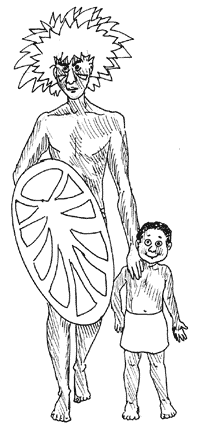Tiny charmers: Babies symbols of peace

DRAWING BY DEBORAH DERR McCLINTOCK
Q. Just how charming and disarming can a baby be? –M. Esselman
A. In Reading Faces, Brandeis University psychologist Leslie Zebrowitz recounts a trip with her baby to a border town between North and South Korea at a particularly tense time: Orders were for everyone to keep hands down and refrain from talking with the guards.
"Suddenly, my son Loren waved his hand, and his high- pitched 'hi' chimed across the room. I turned toward the nearest North Korean guard, expecting to see his automatic weapon trained on us. Instead, it was a large grin that was leveled at my son. The transformation in this 'enemy' soldier's stony face brought tears to my eyes."
Traveling through China with a group including a six-month-old, Zebrowitz was struck by the crowds' similar reaction: Complete strangers stopped to admire little Melanie, making up-close funny faces, ooohing and aahing, baby-talking themselves silly– a universal language.
A "candid camera" study of 4,000 pedestrians in Germany and Italy showed many smiling when passing a baby, stopping to baby talk, and chatting with Mom.
Even young children share the aura: The Masai of Africa and the Aboriginals of Australia, as a peacekeeping sign, will "approach outsiders with their hand on the shoulder of a child, who walks just in front of them."
Q. If you don't like your face very much, how about a face transplant? Any good guess as to how long before this stunner might hit the medical marketplace? –D. Gray
A. Several surgical teams around the world are in fact already making plans for such a procedure. Yet moral, ethical, and psychological issues abound, says James Randerson in New Scientist magazine. For instance, how does one cope with the new visage, which won't look like either the recently deceased donor (four hours after death) or the recipient, whose bone structures obviously differ? In effect, a "third face" is created. Would the family of the recipient even recognize their loved one?
Then there's the serious problem of the immunosuppressive drugs, "which can cause high blood pressure, diabetes, infections and cancer." High doses would be required, due to the large amount of grafted skin, a tissue that provokes a stronger immune reaction than any other organ, says Randerson. Some estimates have put the rejection rate at 10 percent, while others peg it much higher.
Failure would force removal of the donor face and require numerous skin grafts, making things worse than before. Yet there are burn or injury victims whose facial disfigurement has so changed their lives that in the future a transplant may seem worth the risk.
Q. The door shuts, then the circular room starts spinning, faster and faster, hitting maybe 30 rpm now as the "illusionary" centrifugal force plasters you against the wall so hard that when the floor suddenly and alarmingly falls away you're suspended by the friction, so stuck there that in your agility you could squirm around into an angled position and even turn upside down as you peer into the space below, then again right yourself before the floor returns to meet your feet, the whole thing slowing, slowing as the force disappears, the door opens, and out you walk, a bit woozily. Where are you? –A. I. Wonderland
A. At the amusement park Rotor, aka the Gravitron, as described by David Halliday, et al. in Fundamentals of Physics, 6th Edition. Here the real force is not centrifugal (outward), but directed toward the center. This illusion is part of the fun. Interestingly, the required rotational speed is independent of the rider's weight. Anyone from a child to a Sumo wrestler could get on, which is why no one has to "weigh in" to ride the Rotor.
Q. If the Earth's four and a half billion years were somehow compressed into a single calendar year, what month and day would we humans emerge? –A. Einstein
A. On January 1 of this geologic timescale, Earth formed out of matter surrounding the sun, then in mid-March rocks began to form, sea life sprang up in May, plants and animals in late November, dinosaurs ruled in mid-December but bowed out by December 26, say Paul Hewitt et al. in Conceptual Physical Science.
Our species Homo sapiens wouldn't make its debut until December 31 at around 11pm. All of recorded history would take place in the last few seconds of New Year's Eve!
Send Strange questions to brothers Bill and Rich at .
#